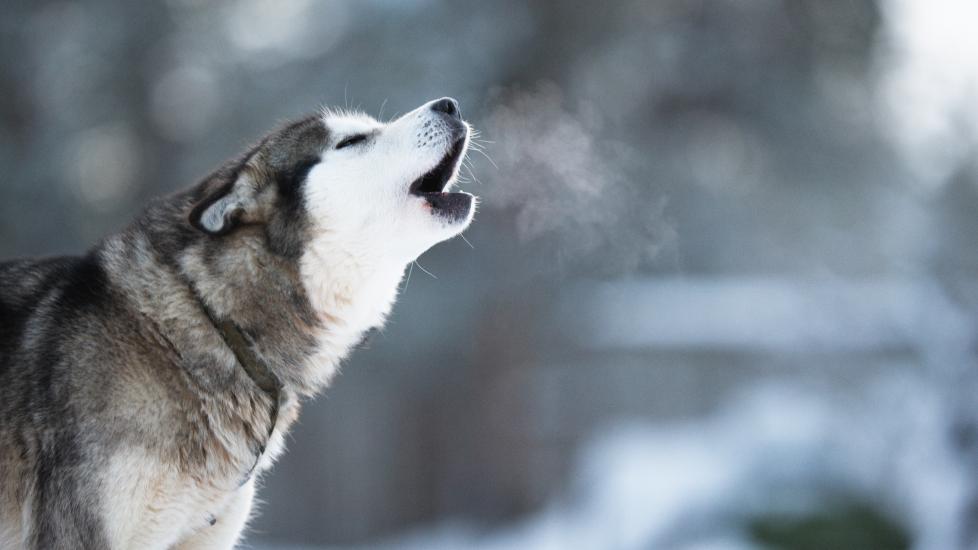Why Do Dogs Howl at Sirens?
Dogs sometimes exhibit behaviors that can be confusing to humans.
For example, when an emergency service vehicle races by with its lights flashing and sirens blaring, why do some dogs howl, while others completely ignore it?
Let’s explore why some dogs exhibit this curious behavior.
Why Do Dogs Howl?
Domesticated dogs descended from wolves more than 15,000 years ago. Wolves use howling to communicate with their pack members over long distances, which seems to serve a similar purpose for our beloved canine companions.
Here are a few reasons they use this vocalization:
-
Communication—Your dog may howl to communicate with you or other dogs. They may use this vocalization to signal their whereabouts to other dogs and as an invitation to have a meet and greet.
-
Attention seeking—If you quickly react to your dog’s howling, they may use the behavior to get your attention.
-
Express emotions—Your dog may howl to express emotions such as happiness, excitement, or distress.
-
Express anxiety—Dogs affected by separation anxiety often howl when they are separated from their pet parent.
-
Pain response—Your dog may howl if they are sick or in pain, especially if the discomfort is sudden.
-
Response to a triggering noise—Many dogs howl in response to triggering noises, such as sirens or music, and scientific analyses suggest they have a sense of pitch.
Why Do Dogs Howl at Sirens?
We don’t truly know the reason behind dogs howling at sirens. However, experts have two strong theories for why dogs commonly howl at this sound:
-
Mistaken identity—One theory is that your dog mistakes the siren for another dog, and they howl to communicate with them and let them know where they are. Your dog is being sociable and doesn’t want the perceived poor lonely pooch who is wailing (the siren) to go unanswered.
-
Home defense—Another theory is that your dog perceives the siren as a potential threat, and they want to warn you about the possible danger. Your dog likely continues to howl at sirens because the vehicle makes your dog think their howling scared away the danger, reinforcing the behavior.
Are Sirens Bad for a Dog?
Dogs have much better hearing than humans. While the human ear can detect pitches up to 20,000 hertz (Hz), dogs can hear frequencies as high as 45,000 to 67,000 Hz. In addition, dogs’ ears are mobile and can rotate like a satellite dish, allowing them to pick up sound from all directions. They can also hear sounds four times farther away than we can, which means your dog may hear noises, such as sirens, from distances that you can’t.
As anyone who’s been in traffic when an emergency vehicle with sirens blaring passes by knows, they emit a loud sound. This, combined with our canine companions’ ultra-sensitive hearing, may make you wonder, “Are sirens bad for dogs?”
If your dog howls at sirens, it doesn’t necessarily mean that the noise bothers your dog or causes them pain. Dogs use body language to express their emotions, and if your canine friend is howling but not showing other signs of stress—such as lip licking, hiding, shaking, or lifting a front limb—they are likely not distressed or upset by the sound.
Sirens can, however, trigger a canine’s noise phobia, but unless the noise’s decibel (dB) level is sustained at 65 dB for a long period or reaches 100 dB or more, your dog’s hearing should not be negatively affected.
Is It OK for Dogs to Howl at Sirens?
Howling is a natural canine behavior, and if you live in a rural area, your dog’s howling may not be problematic.
However, if you have nearby neighbors or live in an area where emergency vehicles are common, howling can be an issue. Ways to help curb your pup’s howling behavior include:
-
Cue for quiet—Train your dog to be quiet by giving them a “quiet” cue and rewarding them with a high-value treat “quiet” cue. They may not obey initially, but with patience and consistent training on your part, they will learn that refraining from howling at the siren earns them a yummy treat.
-
Refrain from scolding—Scolding your dog when they howl at a siren may cause them to associate the siren with a negative experience, potentially leading to anxiety issues or a noise phobia.
-
Seek veterinary help—If your dog’s howling is excessive, seek advice from your vet to ensure your pup doesn’t have an underlying health problem. If necessary, find professional behavioral help.
Why Some Dogs Don’t React to Sirens
If you have a multiple-dog family, you may have noticed that not all dogs howl at sirens.
Data from a recent study suggest that ancient breeds more closely related to wolves, such as Huskies, Malamutes, and American Eskimos, are more likely to howl at sirens than other breeds.
In addition, dogs like Beagles, Foxhounds (American and English), and Coonhounds (Black and Tan and Bluetick), who are bred to hunt and utilize baying, are likely to howl at sirens.
Knowing why your dog howls at sirens can help you better understand your canine friend’s behavior. If your dog’s howling is problematic, contact your veterinarian for help and avoid scolding your pup.
Featured Image: Eerik/iStock / Getty Images Plus via Getty Images
